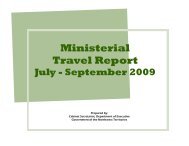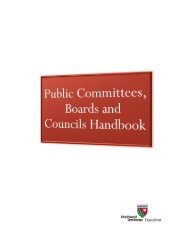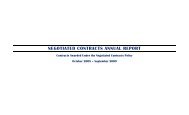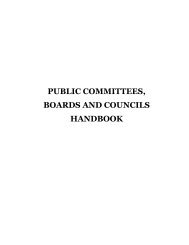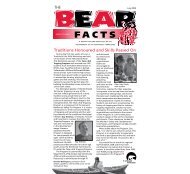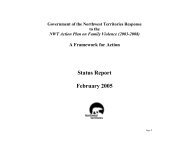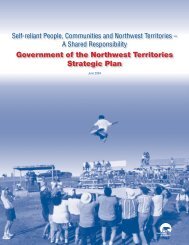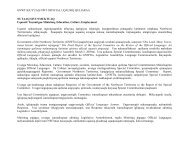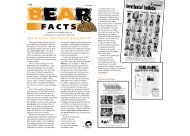Act Now - The Report of the WCB Legislative Review Panel to the
Act Now - The Report of the WCB Legislative Review Panel to the
Act Now - The Report of the WCB Legislative Review Panel to the
- No tags were found...
You also want an ePaper? Increase the reach of your titles
YUMPU automatically turns print PDFs into web optimized ePapers that Google loves.
Workers’ compensation payments are not income and as such are not subject <strong>to</strong>terri<strong>to</strong>rial, provincial or federal income taxes. A worker cannot contribute <strong>to</strong> incomebasedinsurance programs or pensions, such as Employment Insurance or <strong>the</strong> CanadaPension Plan, because compensation payments are not considered income.Some stakeholders <strong>to</strong>ld <strong>the</strong> <strong>Panel</strong> that permanent pensions should not be based on <strong>the</strong>degree <strong>of</strong> physical impairment that a worker has experienced as a result <strong>of</strong> a work-relatedinjury. <strong>The</strong>y argued that in some cases, a physical impairment is not a measure <strong>of</strong> wageslost. <strong>The</strong>y also pointed out that <strong>the</strong> workplace has changed and many jobs are not nowbased on physical ability. O<strong>the</strong>r stakeholders <strong>to</strong>ld us that even if a worker can continueworking with a physical disability or impairment, <strong>the</strong> worker has still lost something thatcan never be recaptured and <strong>the</strong>refore <strong>the</strong> worker should be financially compensated.<strong>The</strong> majority <strong>of</strong> respondents <strong>to</strong> <strong>the</strong> Stakeholder Questionnaire thought that a wage lossapproach was better than a physical impairment or disability approach.All jurisdictions use <strong>the</strong> wage loss approach for temporary financial compensation. Allo<strong>the</strong>r jurisdictions but British Columbia use a form <strong>of</strong> wage loss as <strong>the</strong> basis for longerterm or permanent financial compensation. Eight jurisdictions include some form <strong>of</strong>financial compensation, usually a lump sum, for permanent physical or psychologicalimpairment.With a wage loss approach, <strong>the</strong>re is an ongoing relationship between <strong>the</strong> injured workerand <strong>the</strong> <strong>WCB</strong>. <strong>The</strong> amount <strong>of</strong> financial compensation is reviewed at regular intervals <strong>to</strong>determine whe<strong>the</strong>r <strong>the</strong> injured worker is capable and able <strong>to</strong> return <strong>to</strong> <strong>the</strong> workforce.Obviously, if an injured worker is earning wages, <strong>the</strong>re is no need <strong>to</strong> compensate for aloss <strong>of</strong> wages.<strong>The</strong> terminology used <strong>to</strong> describe <strong>the</strong> wage loss system in o<strong>the</strong>r jurisdictions varies.Terms like wage loss, earnings loss, impairment <strong>of</strong> earnings capacity, loss <strong>of</strong> earningcapacity, loss <strong>of</strong> earnings and income replacement indemnity are variously used.<strong>WCB</strong> <strong>Legislative</strong> <strong>Review</strong> <strong>Panel</strong> <strong>Report</strong> Page 52 <strong>of</strong> 128December, 2001




